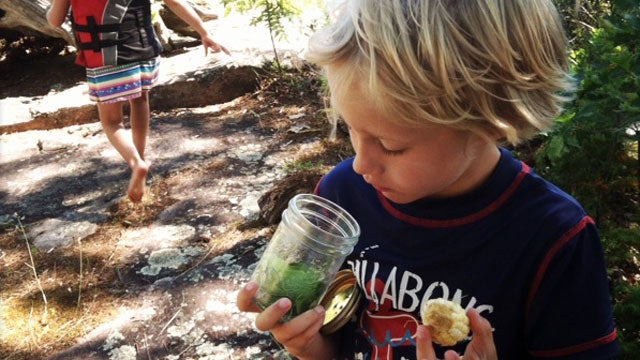Our annual island vacation in Ontario ended last week, just before dawn. A faint scrim of pink rimmed the eastern horizon, but otherwise the night sky was black. Getting up with little ones at this hour isn’t high on my list of enjoyable activities, but this morning—the pale first light, the stillness of the water, the deep old familiarity of a place I’ve loved all my life—was a farewell gift. It’ll be a whole year before we’ll be back to see another sunrise like that.
More Raising Rippers:
Katie Arnold and other columnists on family adventure and bringing up active children.No matter where or how you spend your summers—at the ocean, in the mountains, on the river, at home in the hot lazy city—they have a way of embedding themselves into our characters. As children, we learned to be free in the summer, to run a little wild and invent our own fun; as adults, summers keep us young. It’s all about living more loosely and simply.
Each year, I vow to carry summer with me all winter, but each year, no sooner am I home than I get swept back into real life: wearing shoes, locking our doors when we leave, and readjusting to life in a much larger, busier community. Summer’s not over, not even close, but here are a few ad hoc ideas for bottling the best of the season so it will last all year.
1. Befriend kids of all ages
On the last night of our vacation, we boated across the lake for dinner with some friends of my parents. I’d never met them, but their grandchildren were visiting, and they wanted to get the kids together. I was expecting kids my daughters’ ages, three and five, but as it turns out, theirs were nine, 12, and 15. Not that it mattered. Within minutes of arriving, Pippa and Maisy were catching frogs with the two boys and their teenage sister. During the school year, when social life becomes more regimented by age and grade, encourage your children to cultivate friendships with kids of different ages; this might mean that you need to stop discriminating, too. Invite families with older or younger kids over for a visit. Even if they’re shy, your kids will probably warm to the idea faster than you think.
2. Appreciate your elders
This summer, my mother taught Pippa, who’s five, to tie her shoes. It hadn’t even dawned on me. I was too busy managing both girls and trying to make my deadlines and not die from exhaustion ever since three year-old Maisy had turned into a sleep terrorist. Summer’s one of the best times to spend extended time with extended family, and grandparents, aunts, uncles, and grown-up friends can give kids something that parents often lack: time and patience. After the summer’s over and everyone disbands, you can still encourage your youngsters to spend time with adults other than you. Make an effort to see grandparents more often, and teach them that grown-ups, when treated with respect, can be good friends, too.
3. Buy a butterfly net
When I showed up at my parents’ friends’ cottage the other night, our host, Mark, greeted me with the news, “Your girls are out frogging.” I thought that was Canadian for goofing around, but he meant it literally. Then they appeared around the corner of the house each carrying a butterfly net and carrying on with great seriousness about the frog pond out back. Whether or not the butterfly net was actually put to use, as an accessory it was genius. Even the idea of catching a speckled winged insect made them instantly more curious, adventurous, and tuned into their natural surroundings. Come winter, when butterflies have flown the coop, send them into the yard or park to track squirrels, birds, and rabbits in the snow; or give them a bird book and have them start their life list.
4. Collect insects
A corollary to #3. Build your own bug jars out of tupperware or jam jars with holes punched in the top, or even a paper takeout coffee cup with Saran Wrap. Fill the cup with leaves or other edibles (corn cobs, anyone)? Then shoo your kids outside to see what they can find. Pine cones work well in winter.
5. Disable your data
We got wi-fi at our cottage a few years ago. The modern, connected world keeps creeping in, and it’s hard to stave it off, even for a few weeks. Fortunately, this summer I found a way. I turned off data roaming on my iPhone. Data charges in Canada are astronomical, so my original goal was to save some dough. Then I realized that unless I was connected to wi-fi, I couldn’t receive or send emails. I could make and receive phone calls and even text messages, but I couldn’t waste time checking Facebook, obsessively monitoring my inbox, posting photos, or tweeting. Call it a soft unplug. If you can’t reach me, that’s where I am.
6. Turn off the radio
At home in Santa Fe, we seldom watch TV, but the kitchen radio is always playing. “Morning Edition” is the backdrop to breakfast; when it ends, we switch over to the local indie-music station. The radio’s always on in the car; I’m listening to Pandora right now. But up at the cottage, our Panasonic radio is ancient, the kind you swivel with a dial, and the reception is poor. This means no music, no news, no weather forecasts, and no commercials. The absence of constant ambient noise brings a delicious, sensory calm to the house. You can hear the boats droning past, the loons calling, the wind in the pines. Sure, I miss out on current events, but nothing happens that I can’t pick up online. Try a couple mornings each week with no audio-visual distractions.
7. Keep things simple
At a family reunion to celebrate my 89-year-old great uncle who still spends part of his summer on the island, my cousins made some salads, barbecued pork ribs on a wacky Italian BBQ, stuck some beer and wine in a wheelbarrow, and called it a party. And it was. When food’s not the focus, friends and family are. Rather than sweat the details, channel summertime instead, invite your friends over for a potluck, and remember why you’re gathering in the first place: Not to show off a fancy new dish or your chef’s kitchen, but to simply be together.
8. Swim
Back home in the desert, there’s one thing I can’t easily duplicate about summer, and that’s the lake right out our front (and back) door. No matter how much I prefer murky lake water over see-to-the-bottom chlorinated pools, I love to swim, period: the ease of floating, suspended, feels a little like going back to my natural state. So this year, I’m going to keep swimming—all winter. It’s good cross-training, and if you keep your kids in pool all year, too, they’ll be stronger swimmers next summer.
9. Play games
After dinner and on rainy nights when we were kids, my siblings and cousins and I would gather around my grandmother’s old vinyl-topped card table to play Hearts or spoons or ttedious but highly competitive games of Trivial Pursuit. Turn off the computer and make time. A spontaneous Sorry! showdown will make any dark December night feel like July all over again.
10. Want (and buy) less
Our cottage is 115 years old. Musty antique books line the shelves in the living room; a pair of old green lanterns hangs beside the fireplace. The piano’s out of tune, and the wide plank floors are scratched. Most of the furniture dates back to the 1920s, when the building was a YWCA camp, and it shows its age: The chairs and dressers are nicked and chipped, and some are even scrawled with 90-year-old pencil graffiti. Our canoe is dented but floats, and one of our kayaks is patched with duct tape. In its own ramshackle way, the place is kind of perfect. But back at home, in real life, it’s easy to get sucked in to wanting more, better, newer, fancier—gear, cars, toys, stuff. It’s so exhausting. Instead, try to love the imperfections.


